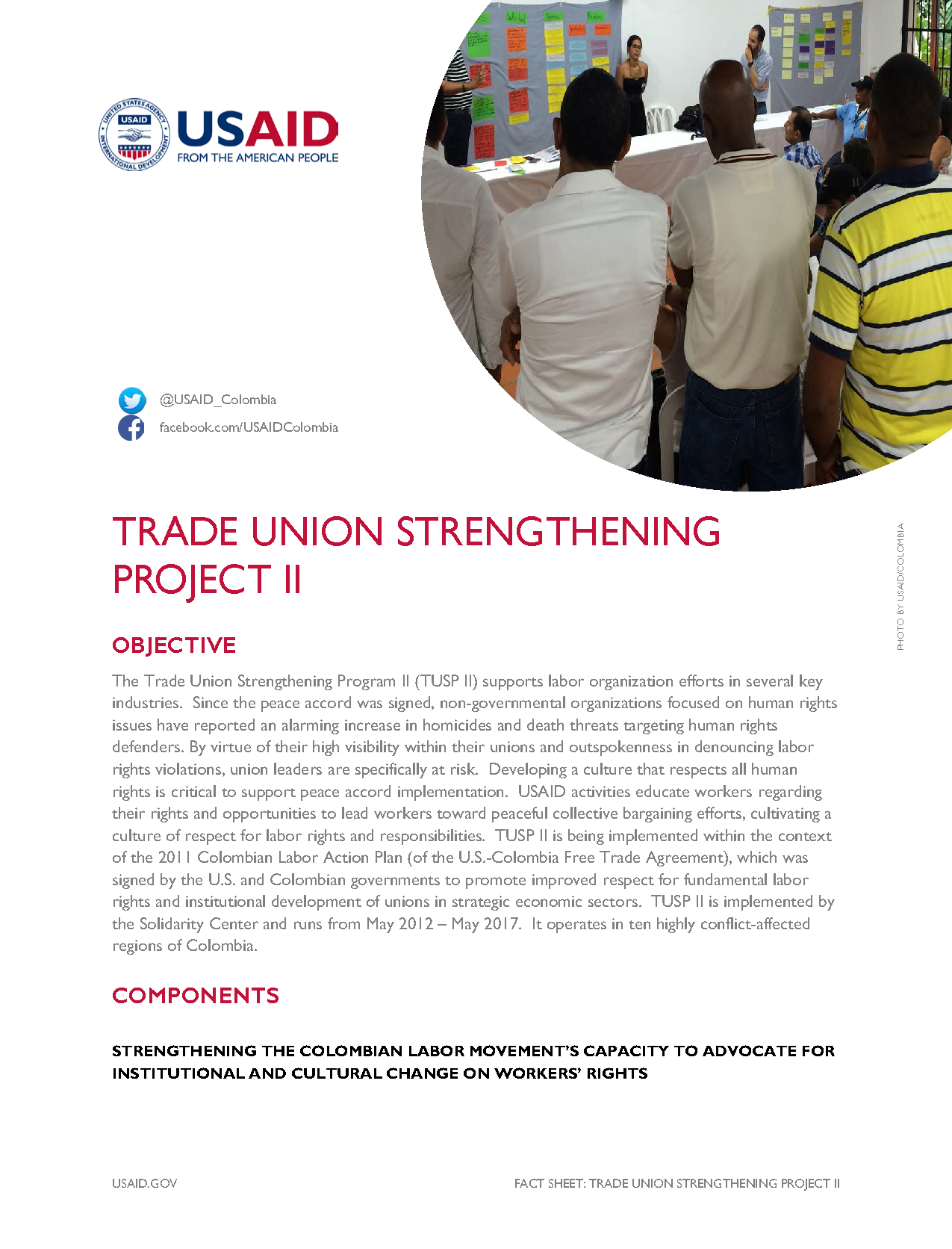Trade Union Strengthening Program II Fact Sheet ![]() (pdf - 213k)
(pdf - 213k)
OBJECTIVE
The Trade Union Strengthening Program II (TUSP II) supports labor organization efforts in several key industries. Since the peace accord was signed, non-governmental organizations focused on human rights issues have reported an alarming increase in homicides and death threats targeting human rights defenders. By virtue of their high visibility within their unions and outspokenness in denouncing labor rights violations, union leaders are specifically at risk. Developing a culture that respects all human rights is critical to support peace accord implementation. USAID activities educate workers regarding their rights and opportunities to lead workers toward peaceful collective bargaining efforts, cultivating a culture of respect for labor rights and responsibilities. TUSP II is being implemented within the context of the 2011 Colombian Labor Action Plan (of the U.S.-Colombia Free Trade Agreement), which was signed by the U.S. and Colombian governments to promote improved respect for fundamental labor rights and institutional development of unions in strategic economic sectors. TUSP II is implemented by the Solidarity Center and runs from May 2012 – May 2017. It operates in ten highly conflict-affected regions of Colombia.
COMPONENTS
Strengthening the Colombian labor movement’s capacity to advocate for institutional and cultural change on workers’ rights
In order to effectively implement the labor reforms currently underway in Colombia, TUSP II supports workers and their organizations to become better prepared and positioned to participate in the reform process. Training is provided to help them understand, monitor and promote the application of existing legal protections, as well as to advocate for further reform. Support is provided to help workers form unions in strategic industries like the petroleum, mining and energy sectors; agro-industrial sectors, including sugar cane and palm oil; and the ports and public sectors. Additionally, participants are trained in skills and techniques to more effectively engage with government institutions and civil society organizations, improve institutional responsiveness and facilitate social dialogue and labor negotiations.
Promoting the inclusion of women and vulnerable worker populations, and their priorities in labor organizations in Colombia
Awareness raising campaigns and workshops are being conducted by TUSP II to teach vulnerable populations, like women and ethnic groups, about their rights and protections under current labor law and how to advocate for enforcement and improvement of those protections. Special training is also given to build leaders among vulnerable populations, helping them to participate in unions and engage and lobby government institutions and employers. By supporting women and others in key leadership roles, a more inclusive and fair labor market can be nurtured.
RESULTS
- Increased union representation in the petroleum, sugar cane, ports, palm oil, electric, transportation, and mining sectors.
- Strengthened labor rights protections through the publication of Decree 36 by the Colombian Ministry of Labor in January 2016, which details the use of contratos sindicales, a form of labor sub-contracting.
- Assisted in the formalization of 3,800 workers in the National Vocational Training Service.
- Helped promote workers’ rights through the filing of 619 actionable complaints at both the administrative and court levels. In addition, actions seeking protective measures for workers have been filed with the Organization of American States in Washington D.C.
- Developed six key policy proposals to increase women’s active participation and leadership at the National Women’s Congress, which was presented for debate by the largest union in Colombia. At the National Women’s Congress, 310 female delegates from around the country participated, and five new policies were adopted.
- Increased participation of women workers in important unions in 19 departments.








Comment
Make a general inquiry or suggest an improvement.